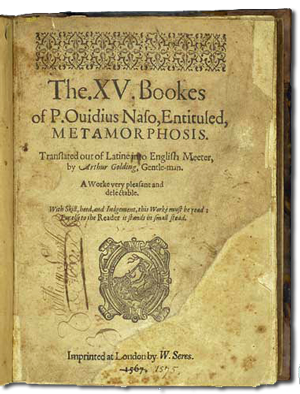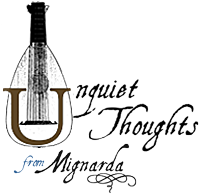Saturday quotes 2.30 Dowland Part 8
 Diana Poulton’s excellent biographical study (John Dowland, University of California Press, Berkeley, second edition, 1982) presents the results of a lifetime of painstaking research into the man and his music, much of it gained through examination of primary sources. While the book effectively lays out the life of a well-travelled and highly respected musician whose reputation allowed him access to noble houses across the Continent, through no fault of the biographer, there is very little surviving information that tells us about the man, his character, his education, and which, if any, song texts were penned by the great Elizabethan lutenist composer.
Diana Poulton’s excellent biographical study (John Dowland, University of California Press, Berkeley, second edition, 1982) presents the results of a lifetime of painstaking research into the man and his music, much of it gained through examination of primary sources. While the book effectively lays out the life of a well-travelled and highly respected musician whose reputation allowed him access to noble houses across the Continent, through no fault of the biographer, there is very little surviving information that tells us about the man, his character, his education, and which, if any, song texts were penned by the great Elizabethan lutenist composer.
Evidence of Dowland the writer is found in the dedications and introductory remarks of his four published books of songs (1597, 1600, 1603, 1612), the instrumental collection Lachrimae or Seaven Teares (1605?), his translation of Andreas Ornithoparcus His Micrologus (1609), and his translation of Besard’s Necessarie Observations, with additional ‘other’ remarks concerning strings, fretting, and tuning (1610). Dowland left behind two other bits of writing that offer a glimpse of his character and taste. Unfortunately, both were written for specific purposes, the first, a letter, seemingly penned in a state of panic, and the second, a dedicatory poem contributed to Giles Farnaby’s (c.1563 –1640) Canzonets to fowre voyces, published in 1598.
Since first encountering Dowland’s dedicatory poem found in Farnaby’s Canzonets, I’ve been puzzled by what seems obscure imagery, clumsiness of meter and rhyme, and the randomness of his rambling form. Dowland did in fact produce a few song settings that are less than graceful. ‘Would my conceit that first enforst my woe’ (First Booke, 1597, XVI) is a re-working of Luca Marenzio’s ‘Ahi dispietata morte’ (Madrigali a quatro voci, Libro primo, 1585, XIII) but the anonymous English text can best be described as ill-fitting. There are also several cases in Dowland’s books of ayres where the singer must be creative in order to fit additional verses to music (‘Time stands still’, ‘Come heavy sleep’). But none so obscure, limping, and seemingly inane as the text of ‘Thou only shalt have Phyllis’. One tries in vain to make sense of the poem and find some way to square this bit of verse with the reputation of the man who composed such intelligently written pieces as the Galliard to Lachrimae, and who wrote so many ideal lute songs.
The dedicatory poem:
M. Io. Dowland to the Author
THOU ONLY SHALT HAVE PHYLLIS,
Only thou fit (without all further glosses)
Crouned to be with euerlasting Roses,
With Roses and with Lillies,
And with Daffadoundillies,
But thy songs sweeter are (saue in their closes)
Then are Lillies and Roses:
Like his that taught the woods sound Amaryllis,
GOLDINGS; you that have too, too dainty NOSES,
Auaunt, go feede you them elswhere on ROSES.
Diana Poulton was understandably befuddled by the poem, politely suggesting that it must have meant something to a person who lived in the age in which it was written. Attempting to shed some light on the meaning of the poem, she looked for borrowings and similarities, finding a line in Virgil’s First Eclogue that bore resemblance to line 8, in its reference to Amaryllis. Puzzled by Dowland’s use of the term ‘goldings’, Mrs. Poulton went to some pains in an attempt to understand its meaning, but to no avail. She found no meaningful reference to the term in the OED, but in the current edition there are two: ‘Golding’ is defined as 1) a gold coin, or 2) a kind of hop vine.
As Shakespearean scholars know very well, the task of deciphering Elizabethan puns presents a lifetime of work. But one need not dig too far beneath the surface to find that the aptly capitalized GOLDINGS in Dowland’s poem suggests a proper noun, naming none other than the prolific English translator, Arthur Golding (c. 1536 – 1605). Golding is most famous for The. xv. Bookes of P. Ovidus Naso, entytuled Metamorphosis, translated oute of Latin into Englysh meeter, by Arthur Golding Gentleman, A worke very pleasaunt and delectable (1567).
It is possible that Dowland’s entire poem is built upon floral terminology gleaned from handy English translations of the poetry of Ovid, a likely source for many of the texts of lute songs. The reference to ‘PHYLLIS’ is drawn from the second poem of Ovid’s Heroides, which describes the sad tale of Phyllis, Queen of Thrace, and Demophoon, son of Theseus and Phaedra. In a nutshell, Demophoon camped cozily at the court of Phyllis after returning from the Trojan War. He left, promised to return, didn’t, and the Gods did the logical thing and turned Phyllis into a nut-bearing tree. Upon Demophoon’s eventual return, he heard what happened, embraced the tree and it burst into blossom, momentarily restoring the form of Phyllis. There are naturally many variations on the story and some confusion in vital details such as whether Phyllis was converted into an almond or a hazelnut tree. But historical hazelnuts were called nux Phyllidos, and are still frequently called filberts, notable among the many nuts of Oregon.
Several other lute song composers referenced the story of Phyllis. In particular, the theme emerges from the text of ‘Down a down, Thus Phillis sung’, song XVI from Francis Pilkington’s The First Booke of Songs or Ayres (1605), a book that includes several floral-themed texts. The first song in Farnaby’s 1598 Canzonets is ‘My lady’s coloured cheeks were like the roses’, and number XVII is titled ‘Among the daffadillies’. As for the relationship between Dowland and Farnaby, we can only guess. Others contributing dedications to Farnaby’s Canzonets include familiar names such as Anthony Holborne, Richard Allison and the recusant poet Hugh Holland. Farnaby is best known as a composer for keyboard, with several of his pieces appearing in the famous Fitzwilliam Virginal Book. Edmund Fellowes in The English Madrigal Composers (Oxford, 1921, 2/1948/R) points out Farnaby’s many compositional faults, claiming that Farnaby wrote more consecutive fifths than any other madrigal composer (p. 235).
Farnaby graduated with a BMus at Oxford in 1592 and Francis Pilkington took a BMus at Lincoln College, Oxford in 1595, stating that he had been a student of music for 16 years. Dowland’s association with these two and other notable musicians of the time quite likely stemmed from their school days. Another possible connection is the fact that Farnaby was also a ‘joyner’, or builder of instruments by trade. There is a chance that he built or repaired instruments for the likes of Holborne, Allison and Dowland, who all contributed dedicatory poems to his 1598 Canzonets.
Leaving aside speculation on the nature of his personal connections with fellow musicians, Dowland’s poem, for all its aesthetic faults, points to Golding’s 1567 translation of Ovid as a likely literary source for at least some of the poetry found in lute song texts.
Next week, we wrap up our adventures with Dowland with a new video and a Christmas gift to our friends who love lute songs.

This is marvelous. I love your wording describing the Gods decision to turn Phyllis into a nut tree as “logical,” and the connection new to me between filberts/hazelnuts and Phyllis. Congratulations on connecting GOLDING to an Elizabethan author. I am sure Derwood is smiling at all this.
I once tried for a grant to connect musical puns with literary puns and rhetorical devices to be based mainly on Dowland’s lute music and contemporaneous dictionaries. One judge who rejected it said (rightly) that it would require me to play the music — something the grants could not fund!
LikeLike
The reference to Golding in Dowland’s poem seems more specifically related to Golding’s translation of Apuleius’ _Metamorphoses,_ aka _The Golden Ass_ than to his translation of Ovid’s _Metamorphoses_ Apuleius hero really does “feed on roses,” by which he is turned from an ass to a human being.
LikeLike
Thank you for this clarification, which certainly confirms the Golding literary reference.
RA
LikeLike